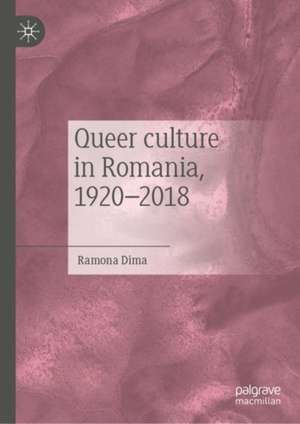Queer Culture in Romania, 1920–2018
Autor Ramona Dimaen Limba Engleză Hardback – 13 aug 2023
The book looks at Romanian queer culture ”from inside”, and from the acknowledgment that the research process is guided by the sensitivity of the approached topics, by the lack of archival footprints, and by a solid dose of media archaeology, especially when looking at the beginning of Romanian LGBT+ activism in the 90s. The book starts from contemporary Romanian cultural products that are focusing on queer topics and/or produced by queer creators. It looks back at the memories of seminal queer and trans activists in extensive interviews conducted for this volume, and fragmented literary and media sources that cover the most part of the 20th century.
About the translation
This book has been translated from Romanian by Andreea Moise.
The Introduction and Chapter 6 were translated by Maria Cohut.
This book has been translated from Romanian by Andreea Moise.
The Introduction and Chapter 6 were translated by Maria Cohut.
Preț: 727.00 lei
Preț vechi: 886.59 lei
-18% Nou
Puncte Express: 1091
Preț estimativ în valută:
139.11€ • 151.58$ • 117.22£
139.11€ • 151.58$ • 117.22£
Carte tipărită la comandă
Livrare economică 24 aprilie-08 mai
Preluare comenzi: 021 569.72.76
Specificații
ISBN-13: 9783031388484
ISBN-10: 3031388488
Pagini: 210
Ilustrații: XVII, 210 p. 1 illus.
Dimensiuni: 148 x 210 mm
Greutate: 0.43 kg
Ediția:1st ed. 2023
Editura: Springer International Publishing
Colecția Palgrave Macmillan
Locul publicării:Cham, Switzerland
ISBN-10: 3031388488
Pagini: 210
Ilustrații: XVII, 210 p. 1 illus.
Dimensiuni: 148 x 210 mm
Greutate: 0.43 kg
Ediția:1st ed. 2023
Editura: Springer International Publishing
Colecția Palgrave Macmillan
Locul publicării:Cham, Switzerland
Cuprins
Chapter 1 Introduction.- Chapter 2 A fragmented history of queerness.- Chapter 3 Queer Romanian Literature.- Chapter 4 Films.- Chapter 5 Romanian queer contemporary art.- Chapter 6 Performance and theatre.- Chapter 7 Issues raised by the interviews.- Chapter 8 Conclusions.
Notă biografică
Ramona Dima is a researcher in queer and gender studies with focus on South East Europe. Her publications and topics of interests include queer culture, sexuality and migration, LGBT+ activism, and anti-gender politics. She is the recipient of a Marie Skłodowska-Curie Postdoctoral Fellowship hosted by the Centre for Gender Studies, University of Stavanger (2021-2023). Dr. Dima holds a PhD from the University of Bucharest and is the initiator and co-organiser of Queer and Feminist Studies in Southeastern Europe International Conference.
Textul de pe ultima copertă
This book is an in depth, extensive study of Romanian queer cultural products and brings an essential and very needed contribution to the literature on Central and SEE gender studies, post-communism studies, media, and cultural studies, while at the same time being very relevant for transnational queer studies.The book looks at Romanian queer culture ”from inside”, and also from the acknowledgment that the research process is guided by the sensitivity of the approached topics, by the lack of archival footprints, and by a solid dose of media archaeology, especially when looking at the beginning of Romanian LGBT+ activism in the 90s. The book starts from contemporary Romanian cultural products that are either focusing on queer topics or (and sometimes both) produced by queer creators. It looks back at the memories of seminal queer and trans activists in extensive interviews conducted for this volume, and fragmented literary and media sources that cover the most partof the 20th century. Ramona Dima is a researcher in queer and gender studies with focus on South East Europe. Her publications and topics of interests include queer culture, sexuality and migration, LGBT+ activism, and anti-gender politics. She is the recipient of a Marie Skłodowska-Curie Postdoctoral Fellowship hosted by the Centre for Gender Studies, University of Stavanger (2021-2023). Dr. Dima holds a PhD from the University of Bucharest and is the initiator and co-organiser of Queer and Feminist Studies in Southeastern Europe International Conference.
Caracteristici
Represents queer cultural history which covers most part of the 20th century until contemporary events Offers an extensive analysis of queer cultural products of different genres Looks back at the memories of seminal queer and trans activists
